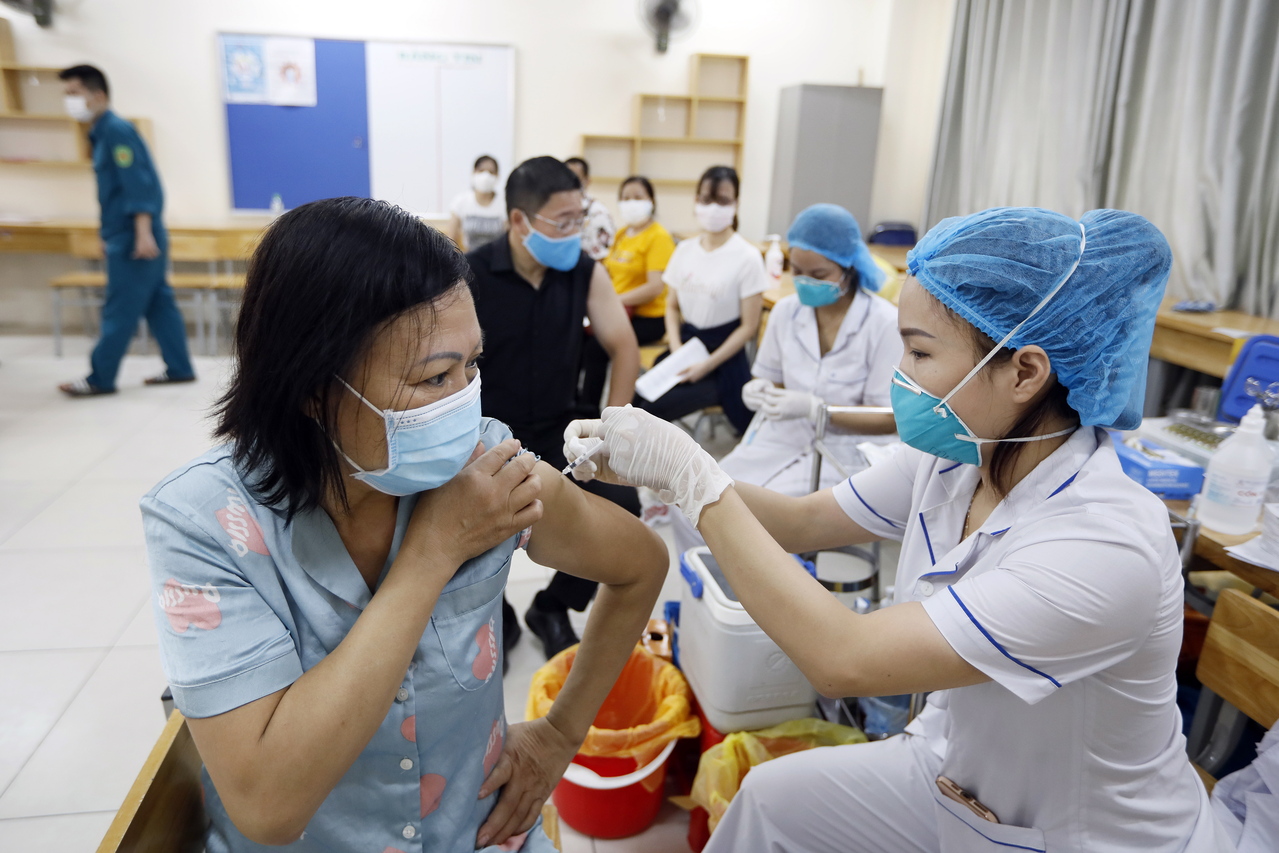Vaccine access widening gap between Asia's advanced and developing economies: IMF
Sign up now: Get insights on Asia's fast-moving developments

A woman receives a Covid-19 vaccine in Hanoi, Vietnam on Oct 7, 2021.
PHOTO: EPA-EFE
Follow topic:
WASHINGTON - The gap between Asia-Pacific's richer and less well-off economies is increasingly widening, with those that lack enough vaccines for their people lagging behind, the International Monetary Fund (IMF) said on Tuesday (Oct 19).
Although the Asia-Pacific remains the world's fastest-growing region, the pace this year is shaping up to be weaker than expected, due to the resurgence of the coronavirus pandemic driven by the Delta variant.
The IMF last week updated its forecast for the region's economic expansion this year to 6.5 per cent, a downgrade from a 7.6 per cent prediction in April.
But the region is expected to grow slightly faster than anticipated next year, as vaccination rates pick up.
Asia's advanced economies - a group comprising Australia, New Zealand, Japan, Hong Kong, South Korea, Taiwan and Singapore - were projected to grow by 3.7 per cent this year. Its developing economies were collectively forecast to grow by 7.2 per cent this year.
On Tuesday, the IMF called for a broader and faster vaccine roll-out as it warned of the growing gap between advanced and developing economies.
Those that had adequate access to vaccines could look forward to further normalisation, while those that did not faced mounting hospitalisations and deaths because of resurgent infections, it said in its annual Regional Economic Outlook report for the Asia-Pacific.
"No country can recover fully until all countries have broad access to vaccines," said the IMF, urging vaccine production to be ramped up and excess doses shared. "The pandemic is not over anywhere until it is over everywhere."
Although Asia's advanced economies had procured enough vaccines to inoculate their populations twice by August this year, their emerging economy neighbours had enough vaccines for only just over half their populations, said the IMF. It cited data from the Duke University Health Innovation Centre.
For instance, 84 per cent of people in Singapore are fully vaccinated, compared with 18.8 per cent in Vietnam, according to official data.
The IMF also stressed that one country's surge could soon be that of its neighbours. For instance, the Delta variant became dominant in Asean countries just over one month after a similar development in India.
For instance, 84 per cent of people in Singapore are fully vaccinated, compared with 18.8 per cent in Vietnam, according to official data.
The IMF also stressed that one country's surge could soon be that of its neighbours. For instance, the Delta variant became dominant in Asean countries just over one month after a similar development in India.
"No country is safe, even if it achieves high vaccination outcomes," it said. "New Covid-19 cases in countries with close regional proximity can lead to an increase in a country's own infections, as movements across borders increase transmissions."
Pointing to the global vaccine sharing scheme, IMF Asia and Pacific regional studies division chief Shanaka Peiris and IMF mission chief for Singapore and Malaysia Lamin Leigh said: "We hope the global rollout of vaccines by Covax can be sped up and move forward seamlessly and are encouraged by recent initiatives."
They noted that for instance, Japan has already donated over 20 million doses to developing countries and is committed to provide at least 60 million, while other advanced economies such as the United States and European Union are also increasing donations.
"We welcome and support the contributions of China and India-with their large manufacturing capacity-to the very important task of making affordable and effective vaccines available to low-income countries," they told The Straits Times.
The IMF report presented data showing that swiftly and broadly inoculating people can significantly boost economic activity over time.
This was consistent with the idea that "a larger share of the population gains greater protection from the virus over time, the risk of infection diminishes, and confidence improves".
But the report also acknowledged that severe outbreaks may temporarily dampen economic activity, for instance, when people socially distance until cases come down significantly.
Countries that lock down their economies to fight Delta surges, although costly in the short term, can lay the foundation for recovery and medium-term growth, it added.
The IMF noted that five countries in Asean - Indonesia, Malaysia, the Philippines, Singapore and Thailand - are still facing severe challenges from a resurgent virus and weakness in "contact-intensive" sectors requiring much face-to-face interaction.
"A recovery is expected in 2022 for the region, supported by notable progress in vaccination, but it would likely remain uneven across countries and sectors," said Mr Peiris and Mr Leigh.
But this outlook is still highly uncertain, they added, as it depends on the path of the pandemic - something difficult to predict, given the potential new strains and uncertainty around the effectiveness of vaccines against them.
They said that Singapore is on track for a solid recovery this year, and with one of the highest vaccination rates globally, is well-positioned to continue a gradual removal of restrictions and facilitate a broad-based recovery.

